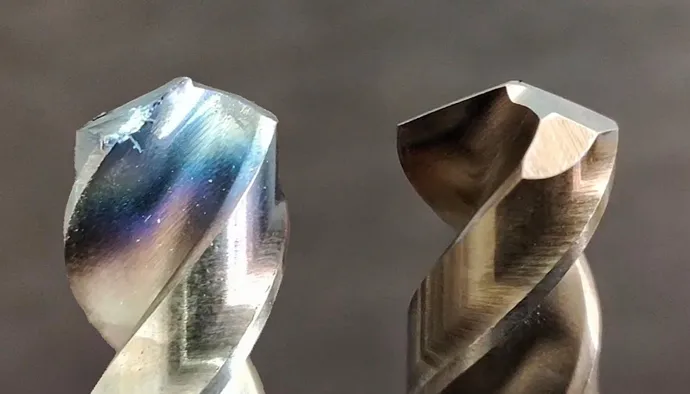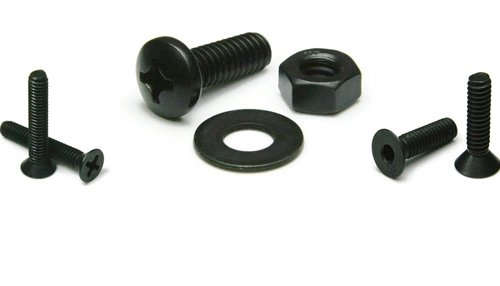Last Updated on July 8, 2022
Cobalt drill bits are extremely hard and can withstand tremendous heat generated during drilling. Cobalt drill bits are the best option for metal drilling because of this.
This is why they are great for high production work and can be found in nearly every industrial drill bit. You can learn more about cobalt drill bits below. Also, read on for a quick comparison between cobalt drill bits and their counterparts.
High-speed steel
When it comes to drilling materials, high-speed steel vs. molybdenum drill bits can be quite a debate. High-speed steel drill bits are comparatively stronger and more durable than their counterparts, while their counterparts contain a higher percentage of cobalt or molybdenum.
Both types of drill bits are extremely useful for various drilling jobs, but one type may be better for some tasks than others.
The difference between these two types of drill bits lies in their composition. While high-speed steel drill bits contain a carbide tip, molybdenum adds hardness and toughness.
It helps maintain these properties during high-speed drill operations, as well as in high-temperature environments. Both high-speed steel and molybdenum drill bits are great for heavy construction.
While both high-speed steel and molybdenum drill bits are durable and tough, M42 drill bits are less ductile and are likely to chip off in extreme circumstances.
The brittle M42 bit is also more susceptible to heat than M7, meaning it may need to be replaced sooner. The higher melting point of M42 drill bits makes them the better option for drilling thick metals like copper and brass.
While high-speed steel is more durable, molybdenum is more expensive than its counterparts. The difference in price is also significant. High-speed steel drill bits are typically more expensive, but are worth it for many applications.
The former is a better choice for those working in a hot environment. It is a versatile material for many different applications. If you are drilling a hole in a rock formation, you’ll need to have a drill bit with a high strength metric.
Cobalt
If you’re looking to buy new drill bits, you’ve probably been debating between cobalt and Molybdenum. Both metals have similar properties but cobalt drill bits are significantly more expensive.
However, cobalt drill bits are also a better choice for high-production jobs. In this article, we’ll compare these two types of drill bits. Continue reading for more information.
Cobalt drill bits are an extension of high-speed steel and contain five to 8% cobalt. These tools can drill through stainless steel, cast iron, and other harder materials.
They possess all the qualities of HSS drill bits and are also more heat resistant. But they are also less durable and require frequent replacement. They are cheaper but they are less durable than cobalt. And they don’t perform as efficiently on hard steel.
Cobalt drill bits can be more expensive but have better corrosion resistance. Cobalt drill bits should not corrode easily, but they may break easily if you’re not careful.
However, they are brittle and could break easily if dropped. This could be a costly mistake. But if you’re in need of a drill bit, then cobalt is your best bet.
Cobalt drill bits are designed for tougher materials. The most expensive ones contain cobalt while M7 drill bits don’t. M42 drill bits are made with 8% cobalt and can drill through the toughest materials.
And because cobalt drill bits are more expensive, they are stronger than M7 ones. These drill bits also need cutting oil, which will reduce heat and friction and increase drill bit durability.
Black oxide
The primary differences between Black oxide drill bits and molybdenum drills are the treatment of the metals and the overall performance. The former are considered to be the most durable and last longer, but their disadvantages make them not ideal for some applications.
This article will discuss the benefits and drawbacks of these two materials and what they do best. A well-tuned bit can save you both money and time.
Generally, Molybdenum drill bits are less expensive than their counterparts, but they are not as durable as HSS. In fact, a high-speed steel drill bit is better suited for drilling in hard rock than a soft metal. The Viking Drill & Tool bits are designed to cut through softer metals.
They are available as a 29-piece drill bit set and are coated with gold dioxide to reduce heat produced during drill-bit friction. Similarly, STROTON drill bits are rated as M42 bits and have a coating of 8% Cobalt. This product includes 19 straight shank bits.
In general, black oxide drill bits offer the most benefits. They are inexpensive and can be used for many different types of drilling. The best ones are designed to drill plastic, wood, metals, and metals.
Titanium drill bits also offer non-corrosive properties and are a good choice for general-purpose drills. And titanium drill bits feature a coating of titanium nitride that reduces friction and increases speed.
TiN
When it comes to choosing the right drill bit, cobalt drill bits are the best option for cutting metals and harder alloys. Cobalt is an alloy, so it is not coated, and drill bits made of this metal can be sharpened again.
These bits are excellent for drilling hard alloy steels, tool steels, spring steel, aluminum alloys, and more. They are also very durable and can withstand high temperatures.
Despite their price tag, cobalt drill bits are extremely durable and can be sharpened without losing their cutting effectiveness. Manufacturers of cobalt drill bits make their bits with a special formula and process. Compared to High-Speed Steel, they can handle extreme drilling temperatures.
The difference in cost and heat resistance are two important considerations. Cobalt drill bits are more expensive than their counterparts in the TiN and cobalt drill bit market. But many Pros value cobalt drill bits for their high performance.
Although titanium and cobalt drill bits are harder than their counterparts, they do not have the same wear and tear characteristics. This makes them suitable for drilling stainless steel, cast iron, and aluminum.
Titanium is not recommended for drilling aluminum, as it is not a good match for this metal. The only real difference between cobalt and titanium drill bits is the cost. However, titanium is also a better choice for drilling hard alloy steels.
M7
One of the first questions that you may be asking is, “What is the difference between M7 molybdenum drill bits and M42 cobalt drill bits?” The M7 bit is made of 92% Hi-Molybdenum and is stronger than the M42 drill bit, which contains 8% Cobalt.
However, the M7 drill bit has a lower melting point and can be easily damaged by high temperatures. If you’re looking for a heavy-duty drill, you’ll want an M7 bit.
Another difference is the amount of Cobalt. Cobalt drill bits are harder than titanium, but they also have less malleability. In fact, cobalt drill bits are stronger and more durable than titanium drill bits and can handle even the hardest metals.
For most maintenance drilling applications, cobalt drill bits are a better choice. They are more durable than HSS drill bits and have a lower chance of chipping in the flutes.
While the M7 bit is a better choice than cobalt drill bits, it’s important to remember that the material itself isn’t the only factor that determines how hard it is.
A well-made drill bit has excellent edge-holding capabilities and a high melting point, so you can use it for a wide variety of drilling projects. If you’re not sure which type of drill bit you need, Greenfield Industries can help you find the perfect one for your needs.
M42
If you’re wondering whether to use M42 cobalt drill bits or M42 molybdenum drill bits, you’re not alone. There are several benefits to both types of drill bits.
One of the main benefits of cobalt drill bits is their increased durability. Molybdenum drill bits are also harder than cobalt, making them a better choice for drilling hard-to-reach places.
Both types of drill bits have their benefits, but each has its own unique set of pros and cons. For starters, cobalt drill bits are made of steel that contains between five and eight percent cobalt.
This alloy makes the drill bits extremely durable and strong. The downside of cobalt drill bits is their high price. The M42 is slightly more expensive than the M7, but it can withstand temperatures up to 1,100°F.
M7 drill bits are slightly more durable than M42 drill bits, but are not as versatile as M42. Compared to M42 drill bits, M7 drill bits can be used on softer materials like wood.
But M42 drill bits are more expensive than M7, and are better for drilling strong metals. They’re not as sharp, but they’re more durable.
M42 has a better wear resistance and red hardness than other alloys, making them the better choice for drilling and cutting applications.
However, it’s important to note that M1 is less susceptible to shock than M2, so it will flex more. But that’s not to say that it’s useless in grinding and other applications. Nonetheless, it’s a better choice than standard molybdenum HSS in many ways.
Frequently Asked Questions (FAQs)
1. What is the difference between molybdenum drill bits and cobalt drill bits?
Molybdenum drill bits are made of a harder metal, so they stay sharp longer and can drill through tougher materials. Cobalt drill bits are designed for use on harder metals, so they can drill through tougher materials more quickly.
2. How do molybdenum and cobalt drill bits compare in terms of price?
The price of molybdenum and cobalt drill bits can vary depending on the manufacturer and the specific features of the bits. However, in general, molybdenum drill bits are more expensive than cobalt drill bits.
Verdict
When deciding between molybdenum drill bits and cobalt drill bits, it depends on the specific project and material being drilled. If drilling through tough metals, then cobalt drill bits may be the better choice. However, if drilling through softer materials, molybdenum drill bits may be the better option.



